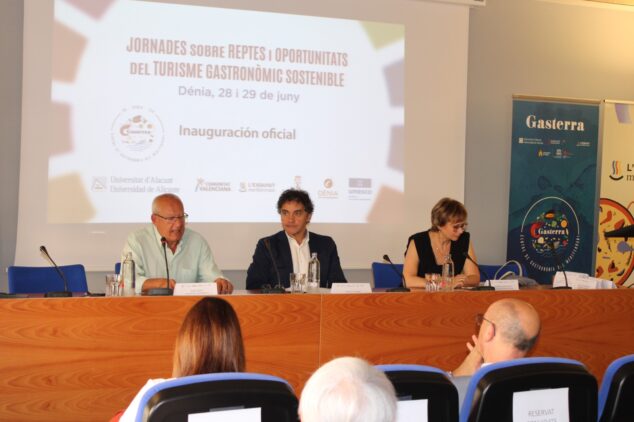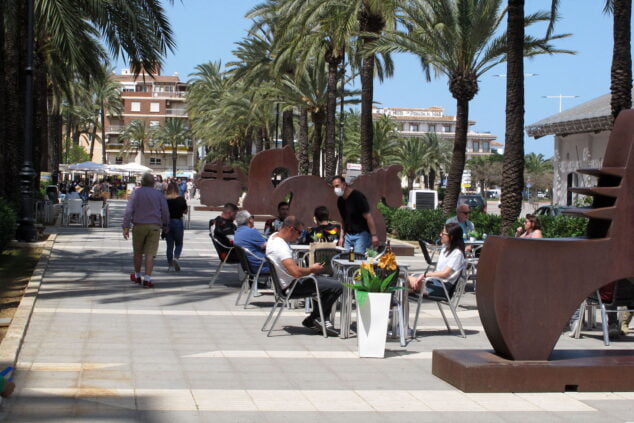The conference "Challenges and opportunities of sustainable Gastronomic Tourism", organized by the Mediterranean Gastronomy Center GASTERRA UA-Dénia, in collaboration with Turisme Generalitat, the Dénia City Council and Dénia Creative City of Gastronomy of Unesco, have been developed during June 28 and 29 at the CdT Marina Alta from Denia. These conferences have addressed the needs and concerns of the sector, analyzing from the public and private initiative point of view how gastronomy can contribute to improving the tourist offer and the positive impact of gastronomic tourism in a territory.
During the inauguration, which was carried out by the Autonomous Secretary of Tourism of the Generalitat Valenciana, Francesc Colomer, the mayor of Dénia, Vicent Grimalt, and the dean of the Faculty of Sciences of the Alicante University, Magdalena García, has already emphasized the importance of these conferences.
In the words of the regional secretary, Francesc Colomer: "gastronomy is a tourist phenomenon that demands our attention and these sessions are absolutely necessary and productive to build a positive story that reconciles the tourist interests of all".
In his speech, Vicent Grimalt stated that "gastronomy is a first-rate tourist resource that, in addition, allows action to defend and protect the environment, promote economic activity and territorial vitality, promote native culture and rebalance the primary sector ”.
Secretary of State for Tourism is committed to supporting food and wine tourism
For Magdalena García, this forum “is an initiative that fosters collaboration between institutions. The University of Alicante has been aware of the importance of gastronomy and the need to train the sector, which is why it has offered a degree in Gastronomy and Culinary Arts, as well as various postgraduate studies related to these subjects. The objective is to train professionals with a transversal vision that allows them to understand gastronomy from a territorial and cultural perspective, and who can apply their knowledge to create responsible companies that improve the economy”.
The inaugural conference was given by María Velasco, advisor to the Secretary of State for Tourism, who explained the commitment to support food and wine tourism and the possibilities offered by the Next Generation funds to all the agents involved in the tourism value chain gastronomy, encouraging them to propose transformative projects that are aligned with the "European objectives".
The first table, entitled "Policies and instruments to encourage sustainable gastronomic tourism", was moderated by the coordinator of the conference, the UA professor Salvador Palazón. The table was attended by experts representing different public institutions closely related to tourism. Javier Solsona, head of the Innovation and Training area of Turisme Comunitat Valenciana, defended gastronomy as a central part of the tourism project, highlighting the work that the network of Tourism Centers (CdT) has done in training in recent decades. He also presented the map of the gastronomic ecosystem linked to the L'Exquisit Mediterrani brand, created to defend the gastronomic heritage of the Valencian Community and to which entities, gastronomic projects, tourist destinations and some 450 restaurants belong. For Jose Luis Catroverde, head of the Promotion, Communication and Marketing service of the Costa Blanca Tourist Board, the objectives of the Board are based on promoting coastal and inland tourism, he pointed to gastronomy as one of the pillars of that promotion and recalled that "we have undertaken various actions focused on the dissemination of the gastronomy of the municipalities of Alicante, to show our wealth linked to the product and the appellations of origin".
How to seasonally adjust tourism in the Marina Alta
For his part, Floren Terrades, director of the Office of Innovation and Creativity - UNESCO Creative City of Gastronomy, stressed that "for us gastronomy is based on tradition, but it is a cultural heritage that is constantly being updated in the light of contemporary ideas”. He highlighted the work they have been doing with the Bancalet project, "a gastronomic innovation project that connects agri-food products and producers with restaurateurs." Finally, he stressed that "a destination that wants to promote itself has to attend to the transfer of knowledge and in this the collaboration with the University of Alicante through GASTERRA plays a fundamental role."
According to Rosario Donderis, manager of the Consortium for the Economic and Activity Recovery of the Marina Alta, "since the beginning of CREAMA we have participated in gastronomic development projects, promoting brands such as 'Peix de Calp', gastronomic weeks, conferences in around products, etc. Donderis highlighted two recent experiences: "a local one, carried out in collaboration with the Calpe City Council and the Fishermen's Association, consisting of a video and a recipe book in which individuals and restaurants have participated, which promotes healthy eating and the quality product; and another of a regional scope, "Passaport Marina Alta", which seeks to structure the territory by uniting the interior with the coast and contribute to deseasonalize tourism.
How to promote wine tourism and oil tourism
The second day was devoted to analysis from the point of view of the company and public-private tourism initiatives. For this, the discussion table moderated by the UA professor Xavier Amat was attended by Remedios Cerdá, general secretary of the Marina Alta Association of Hospitality and Tourism (AETHMA), María Miñano, president of the Wine Route from Alicante, Gonzalo Estela, representative of Olis de Diània, Pep Romany, chef of the Pont Sec restaurant in Dénia, Evarist Miralles, chef and trainer of the Cdt Dénia and Ximo Panella, manager of the local Muntanya d'Alacant Rural Action Group. During it, they sought to answer three questions: how gastronomy can contribute to improving the living conditions of municipalities, how the essence of a territory is transmitted through wine tourism or oil tourism, and what role administrations should play in the development of gastronomic tourism.
All of them, in their speeches, contributed ideas for the development of gastronomic tourism in the Marina Alta and put on the table issues such as sustainability, the consumption of local products, the recovery of traditional crops, the commitment to organic farming as a stimulus for sustainable development and the need to increase connectivity between rural and urban spaces. They also expressed their concern about the need to improve the transport network, the generational change in the countryside, the emptied Spain and the necessary support for the agri-food sector, including fishing.
To make an approach to oil tourism and producers, the association “Olis de Diánia” and “Essències. són Terra y Vincles” set up an exhibition with the great variety of olive oils that are produced in our territory and invited those present to carry out a tasting to check their quality and the differences depending on the type of olive used in their production.
The closing conference was presented by the academic coordinator of GASTERRA, Enrique Moltó, and given by Luis Pujol, destination manager of the Saborea España product club, who reviewed the experience and the work carried out since the beginning of Saborea España to position the food and gastronomic offer of the 25 destinations that today are integrated and collaborate in this initiative.
At the closing of the conference, Salvador Palazón announced the implementation by the University of Alicante of a title of University Expert in Sustainable Gastronomic Tourism and Local Development, which will be taught between February 1 and May 31, 2023. For her part, Juana Jordá, director of GASTERRA, expressed her satisfaction at the success of the conference, thanking all the entities, speakers and participants for their involvement. She also recalled the willingness of the University of Alicante to collaborate in development, innovation, research and knowledge transfer projects generated in the Marina Alta.
The sessions, which were broadcast in streaming, can be visited on the UA's VERTICE platform https://vertice.cpd.ua.es









It's clear. Always betting on tourism without thinking of other alternatives to "fix" young people, here you either open a bar/restaurant or you are a waiter in a restaurant bar. Sad, good and a lot of party and noise….